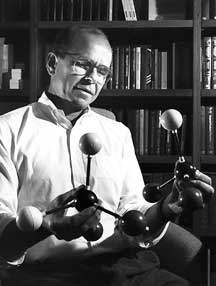K. Barry Sharpless is Awarded the 101st Nobel Prize in Chemistry
By Jason Socrates
bardi
K. Barry Sharpless, Ph.D., W.M. Keck Professor of Chemistry
at The Scripps Research Institute (TSRI), and member of The
Skaggs Institute for Chemical Biology, has been awarded the
2001 Nobel Prize in Chemistry.
Awarded annually by the Royal Swedish Academy of Sciences
for achievements in physics, chemistry, medicine, literature,
economics, and peace, the prize recognizes individuals who,
as stipulated in Alfred Nobel's will, "have conferred the
greatest benefit on mankind." The prize carries a cash award
of about a million dollars.
Sharpless was awarded this year's prize in chemistry along
with William S. Knowles, formerly of Monsanto, and Ryoji Noyori
of Nagoya University in Japan for "the development of catalytic
asymmetric synthesis."
"We are obviously delighted that Dr. Sharpless has received
this recognition," says TSRI President Richard Lerner. "In
my mind, it was inevitable that he would be awarded the Nobel
Prize—the extent and significance of his work are so
far reaching. [Dr. Sharpless] has been recognized for his
prodigious work by the scientific community for many years
and has been acknowledged by the philanthropic community,
most notably Mr. Sam Skaggs, whose contributions have enabled
Dr. Sharpless to achieve many research breakthroughs."
According to the prize committee, Knowles and Noyori shared
half the prize "for their work on chirally catalyzed hydrogenation
reactions." The other half of this year's award recognized
Sharpless "for his work on chirally catalyzed oxidation reactions."
Sharpless contributed innovations to the development of broadly
useful and commercially viable catalytic oxidation chemistry
for the selective production of bioactive chiral molecules
with the proper right or left "handedness."
Chirality, or handedness, is the structural characteristic
of a molecule that makes it impossible to superimpose it on
its mirror image. Proteins, DNA, and carbohydrates are all
chiral molecules: without the correct handedness, they will
not function as the basic molecules of life. Many drugs must
also be of correct chirality; indeed, in some cases, the molecules
with the wrong chirality can be toxic.
Sharpless's methods allow for the manufacture of safer and
more effective antibiotics, anti-inflammatory drugs, heart
medicines, and agricultural chemicals.
In 1980, Sharpless reported a breakthrough in synthesizing
chiral molecules—the highly enantioselective epoxidation
of allylic alcohols catalyzed by a titanium complex which
is now used routinely. More recently, Sharpless developed
another useful method—the asymmetric dihydroxylation of alkenes
catalyzed by an osmium complex.
In fact, these process, named the "Sharpless Astmmetric
Epoxidation, Dihydroxylation, and Aminohydroxylation" have
revolutionized organic chemistry by transforming asymmetric
synthesis from nearly impossible to routine.
Sharpless received his B.A. from Dartmouth College in 1963
and a Ph.D. from Stanford University in 1968. In 1970, following
postdoctoral studies at Stanford and Harvard Universities,
he joined the faculty of the Massachusetts Institute of Technology.
After three years at Stanford in the late 1970s, he returned
to MIT as Arthur C. Cope Professor of Chemistry. He joined
TSRI's faculty in 1991. Sharpless was elected to the National
Academy of Sciences in 1985.
Other significant honors include the Tetrahedron Prize,
the American Chemical Society's Award for Creative Work in
Organic Synthesis and the Arthur C. Cope Award; the Prelog
Medal (Switzerland); the Janssen Prize (Belgium); the Scheele
Medal (Sweden); the King Faisal International Prize for Science
(Saudi Arabia); the Roger Adams Award in Organic Chemistry,
American Chemical Society; the Harvey Prize of the Technion-Israel
Institute of Technology; the National Academy of Sciences
Award in Chemical Science; and most recently, the Wolf Prize
in Chemistry and the Benjamin Franklin Medal. Also, he was
listed among the "Top 75 Contributors to the Chemical Enterprise,"
in the 75 years since the founding of Chemical & Engineering
News.
Links:

|

K. Barry Sharpless is W.M. Keck Professor
of Chemistry at The Scripps Research Institute (TSRI), and
member of The Skaggs Institute for Chemical Biology.
|

